Search results
80 results found.
80 results found.
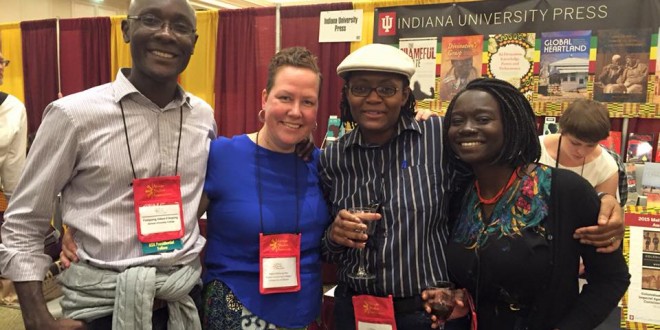 So, I am back from the intense African Studies Association 58th Annual Meeting in San Diego, California, US 19-21 November, 2015!
So, I am back from the intense African Studies Association 58th Annual Meeting in San Diego, California, US 19-21 November, 2015!
It is difficult to summarise such intense days, but I would say my main goals were met:
What I did not get to do was eating great hotel breakfast (the breakfast buffet was not included, shock of the trip!) or really see the city of San Diego as there was really no time.
What I did do that was not on my list was: challenge my fear of heights, both in Balboa Park and on the 12th floor of the nice hotel, and eat crickets! (Tangy, crunchy, and salty!)
So by this time next week, I’ll be on my way to the big African Studies Association 58th Annual Meeting, ASA2015, in San Diego, California, USA. The conference has the theme: The State and the Study of Africa and will be happening 19-22 November. It is an enormous event which attracts over 2000 scholars! I am terribly excited and have the following hopes:
It has been a sad year in many ways. A year of death, disease and loss for me and many others. I have also worked hard on my four careers – social media, research, teaching and family life!
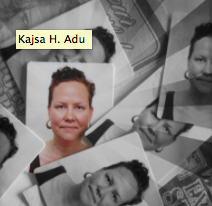
Living in West Africa, one cannot help but think about the effects of ebola on our part of the world. Clearly the effects on Liberia, Sierra Leone and Guinea which have been directly affected are enormous, but Ghana and other West African countries have been affected – economically – as well.
This article put forward by the Nordic Africa institute focus on the effects for Liberia. They say:
“The economies of Liberia, Sierra Leone and Guinea have already been hit hard by Ebola. A major question is whether the negative effects will be temporary or more persistent, according to Eriksson Skoog. The World Bank has lowered its economic growth forecast for Liberia this year, from 5.9 percent to 2.5 percent as a result of Ebola. The budget deficit is expected to grow from 7.1 percent to 11.8 percent of GDP. The economic impact could become much worse if Ebola is not quickly tamed.
The World Bank distinguishes between two types of economic effects from Ebola. On the one hand, there are the direct and indirect costs for healthcare and production loss. On the other hand, there are the behavioral effects due to fear of contagion. People avoid crowds, workplaces shut down and travel and trade are disrupted. The effects caused by aversion behavior are by far the greatest. Hence it is important to address fear as quickly as possible in order to mitigate aversion behavior and normalize business activity.“
The article also discusses problems with aid, for instance donations of rice disrupts the local rice market.
The American CBS Economics of Ebola article was also an interesting read. It says:
“Looking good today does not make people feel confident that they will be sitting pretty in two weeks,” said Stephen Morrison, a senior vice president at the Center for Strategic and International Studies (CSIS) and director of its Global Health Policy Center, in an interview. But “While they are vulnerable … [Ghana and Ivory Coast] have the basics of a functional public health system, which was absent in these other countries. That doesn’t mean that they couldn’t be overrun with an influx of cases.”
Ghana, a country of more than 25 million, shares a border with Ivory Coast. It is also where the U.N. has decided to base its mission to respond to the Ebola epidemic. Washington has provided $1.7 million to the Ghanaian government for Ebola preparedness and response planning. Officials in Ghana, who have made gains in poverty reduction in recent years, have lamented that fears about Ebola have hurt their country’s tourism industry. Fear of the disease is something that economists will continue to monitor.”
Except for the Business&Financial Times story linked to above, I haven’t read too much about the effects on tourism in the region (this article suggests however the sector in Ghana is “collapsing” and the B&FT lamenting story ironically reports a World Tourism Organisation (WTO) conference, “Branding for Africa and Africa’s Image”, which had been scheduled to be come off in Accra from September 9-11, was postponed), but know from my interaction with Swedes that the trip I took home is not on anybody’s wish list – although Ghana has not even been affected by Ebola! That “aversion behaviour” is likely killing many livelihoods in all West African countries.
My home department, the Institute of African Studies (IAS) at University of Ghana has taken a big leap forward this semester by broadcasting all of its famous Thursday seminars on Skype and uploading them on YouTube!
Last year, I suggested the institute should have a presence on social media and set up a Facebook account and a Twitter handle @IASUG (at the time, I could not believe my luck to get such an appropriate 5 letter handle!). I managed the accounts over the 2013 African Studies conference (keynotes also available on YouTube) and then handed it over to the institute.
Now, however you can get more than photos and 140 character snippets – Thanks to new seminar coordinator Dr. Obádélé Kambon – you can experience IAS from the comfort of any place with Internet!
During the weekend 26-27 September, I took part in the Nordic Africa Institute biannual conference Nordic Africa Days. Here is my report!















Since Taiye Selasi wrote her short story in The Lip magazine “Bye-Bye Barbar” introducing to the world the concept of “Afropolitan” much water has run below the bridge. The concept has been much discussed, for instance by Binyavanga and Ms Minna Salami and at several international conferences. Selasie has also published her first novel Ghana Must Go and received much praise for it. Now she revisits her concept Afropolitan (“Did any Afropolitans actually live on the African continent?“) after having spent more time in West Africa.
About Accra, she writes:
“perfect timing: The first international Salsa Congress has just gotten under way. If ever there were a snapshot of the Afropolitan spirit, it’d be this: West African and Latin American salseros side by side in sequins. Melissa Mensah, the organizer, a glamorous Ghanaian-American-Nicaraguan lawyer, explains that salsa classes are the city’s newest craze. With no more than a DJ scratch, the music goes from salsa to azonto (Ghanaian clubbing music), and the line dancing begins. Limping home an hour later, I’m joyous, dripping sweat, resolved: Accra will one day soon be one of my more permanent homes.”
Read Selasi’s whole essay here. Thanks to colleague Kobby Graham for pointing me to this text.
Loved this portrait of Selasi published in Elle.
Yesterday was BlogCamp. It can be summarized with The words people, selfies and an award.
People
BlogCamps are free events to the participant and it had been fully booked for more than two weeks to the day! The venue, Kofi Annan ICT Centre was filled to the brim of people who love blogging!
Selfies
The trend of taking selfies with devices of yourself with others had most definitely come to Ghana. Selfies were happening all over, maybe propelled that many met internet friends for the first time.
An Award
Is as surprised to find I won the Best Female Blog award among good contenders, but very happy as the congratulatory messages kept rolling in on Twitter. Thanks dear reader if you voted for me!
A great day! Hope to see many of you at BlogCamp15!
For more photos, go to Facebook.com/BloggingGhana
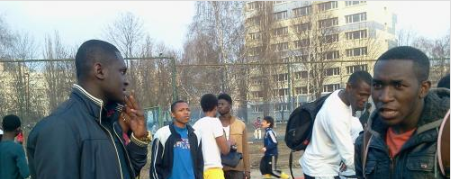 In my research, two times I came across students mentioning Ukrainian recruitment efforts of Ghanaian students. With the political developments unfolding as the focus groups progressed, the image of Ghanaians in Ukraine have burned into my mind.
In my research, two times I came across students mentioning Ukrainian recruitment efforts of Ghanaian students. With the political developments unfolding as the focus groups progressed, the image of Ghanaians in Ukraine have burned into my mind.
When doing some online searches, I found this 2013 article about Ghanaian students being offered to study medicine there. Also, I sat down with MacJordan Degadjor, a friend who studied Management Information Systems in Ukraine 2003-06. His story was interesting and grim.
I went to do a MIS , yes a Bachelors, in Kharkov in Ukraine. I was there 2003-2006, I think. There are a lot of Ghanaians over there…It all started with Kwame Nkrumah’s scholarships and many Ghanaians went to train as doctors, engineers, then they could not return…Nkrumah was no more, they found wives, families. Now some work in hospitals, yes, some teach or just work anywhere. Some also transit to Western Europe from Ukraine.
When you get there, accommodation and tuition is cheap. I started, just like many others, with a six month intensive course in Russian. You know I speak Russian, right? I never learned Ukrainian as I lived on the Russian side. The country is basically divided in two.
I experienced racism against non-Ukrainians and especially blacks. I was beaten twice. There is agitation when they see you, especially with their females. They call African students “monkeys”. There is also general corruption and lawlessness. As a foreign student you must carry your passport at all times, else you are considered a criminal.
The education is intense, practical. For instance we traveled to see things we talked about in class and to see historical monuments and places, They care a lot about history!
It was a good experience, I went for the education, I am happy to speak a new language, for the experience of a new country, many of the people were nice. But even for a conference, I wouldn’t go back. It is so cold. When I first came, it was minus 42 degrees Celsius, and I was wearing a jacket like this!But I feel that as a black person I am safer outside Ukraine than in Ukraine, especially now.
How are Ghanaian students in Ukraine fairing now? Does the Ghanaian government that previously gladly cooperated with the Ukrainian authorities any plans of bringing them back if things get worse?
Photo credit: Ghanaian Students’ Association in Kharkov, Ukraine.
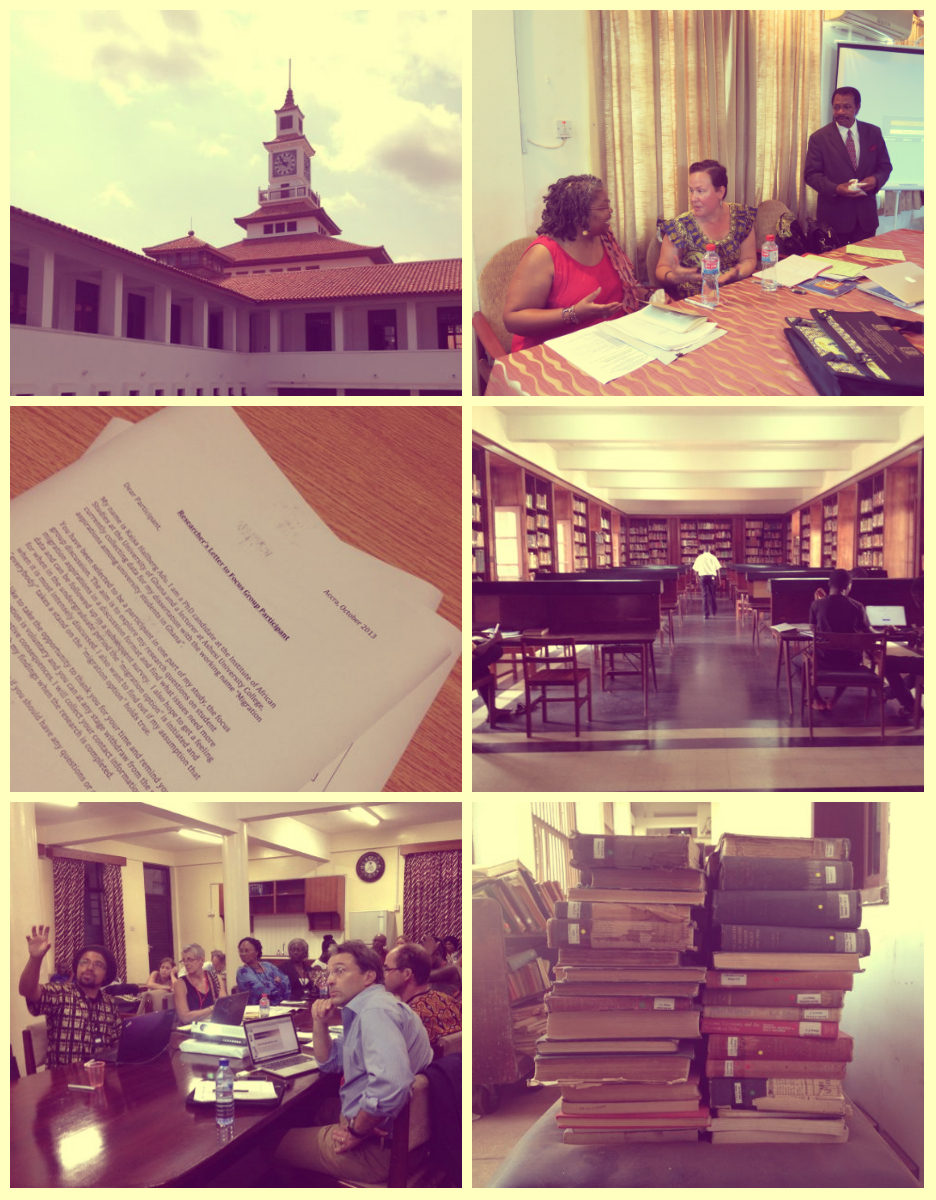
As readers of this blog knows well, I am a PhD candidate with the Institute of African Studies, University of Ghana currently doing my data collection for my dissertation. My research moves very slowly, but this semester, I can see I have gotten over the “what is it really that I am doing?”-stage and entered “this is what I am doing!”-stage of my research degree. The feeling is swell. Some of the winning choices I have made this year includes:
What good choices have you made in your career this year?
Right now, Ghana’s president John Dramani Mahama is in Sthockholm cohosting the GAVI alliance meeting for immunization and next week the Swedish Minister for Trade, Annie Lööf, will be coming to Ghana.
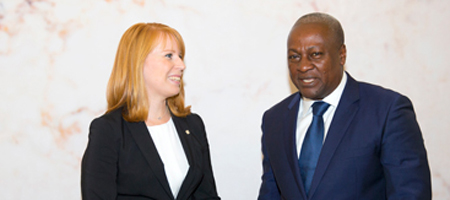
In the photo, minister Lööf and president Mahama. Photo borrowed from the Swedish government website/ Martina Huber.
The president is in Stockholm to campaign for vaccines for all children. Ghana is an “Immunization Champion” and have a strong track-record on immunizations. From the website of GAVI:
“As an innovative global health partner, GAVI is committed to promoting the health of children through immunisation and this must be commended”, President Mahama stated in a meeting with Ms. Evans.
He further observed that, “GAVI deserves the support of all leaders desirous of building healthier communities. I pledge my unflinching support as an Immunisation Champion to enable GAVI achieve its noble objectives.”
The Swedish minister comes to Ghana with a trade delegation including Ericsson, ABB, Atlas Copco, Sandvik och Eltel, continuing on the visit three years ago with the then Minister of Trade Ewa Bjorling. The minister is also following up on her favorite issues: innovation and womens’ leadership. She will visit a local innovation hub, Meltwater, and talk to Ghana’s minister of foreign affairs, Hanna Tetteh about women in politics, according to her schedule (only in Swedish).
Granted, these two news items are suitable for a Swedish/Ghanaian blog. But this time, there are more connections! Last week, I saw Mahama at the ICAS13 conference , my daughter got immunized and next week I have been invited to meet with Annie Lööf ! Report to follow.
Today I get the prompt to “upload my question to the CNN interview with president Mahama”. I think to myself, CNN…Ghanaian government. Was there not a thing there? Going through my emails, in a discussion thread on the perils of “too positive” media coverage, I find a link to this blog post by a BloggingGhana colleague, Roxanne L Scott from the end of May 2013.
In summary, Roxanne writes that the Ghanaian government payed 1,5 million USD to CNN in 2012 for positive coverage under the “CNN Eye on Ghana Project”. The project was centered around tourism and investment and produced stories such as “Welcome to Ghana: Historic castles, exotic wildlife and a golden coast”. (Scroll down and the slideshow title reads: “Ghana: the jewel of West Africa”) This project is no secret, it is covered in official documents!
In the same documents, we can read about the plans for 2013: “the Ministry [of tourism] will augment its Marketing Ghana Programme through intensive use of the international media. Funding will be mobilized in pursuit of the CNN Eye on Ghana project…”
(Docs below I have borrowed from Roxanne)

Roxanne writes:
“I’d love some clarification for how this $1.5 Million goes in reference to CNN.
If it is in fact payment, its unethical.
I recently learned at an arts and culture journalism workshop in Ghana it’s quite the norm for media houses to charge artists and organizations for coverage according to time. For example one can call a radio station in Ghana and get the price for a featured interview. Event planners also charge journalists to “cover” their event. Political parties engage in this as well. After press conferences, political parties pay journalists for coverage.
I thought it was a journalists job to look for the news. A journalists creates the content. If you’re being paid by an organization to cover the news, or if you’re charging for individuals/organizations to feature their content, thats more public relations (PR) and its unethical. You really shouldn’t call yourself a journalist.”
The media ethics debate in Ghana has a long way to go. However, it is not just in Ghana the lines between journalism and PR is blurred, as Roxanne rightly points out. The president’s CNN interview is scheduled for some time in October. Meanwhile, it looks like the CNN Eye on Ghana program alive and well and possibly “augmented” for this year. Does that CNN Eye on Ghana Project involve a primetime presidential interview? Later today over at CNN the window for uploading your video questions for president Mahama closes. CNN iReport, urges:
“Send us your questions for the president in a video (15 seconds or less, please) and they could be asked on CNN!”
I am guessing the most critical voices (if they even can be captured in less than 15 sec!) – “What is the relationship between CNN and the Ghanian government?” and “Can we trust this interview to be objective on the basis that the Ghanaian government is paying CNN for coverage?” will likely not be featured…
My colleague Roxanne ended her blogpost in May with a plea to CNN for some clarification. She never heard back. I hope this time CNN will answer.
Please share this blogpost with your networks if you also want to know more from CNN on their relationship with the Ghanaian government.